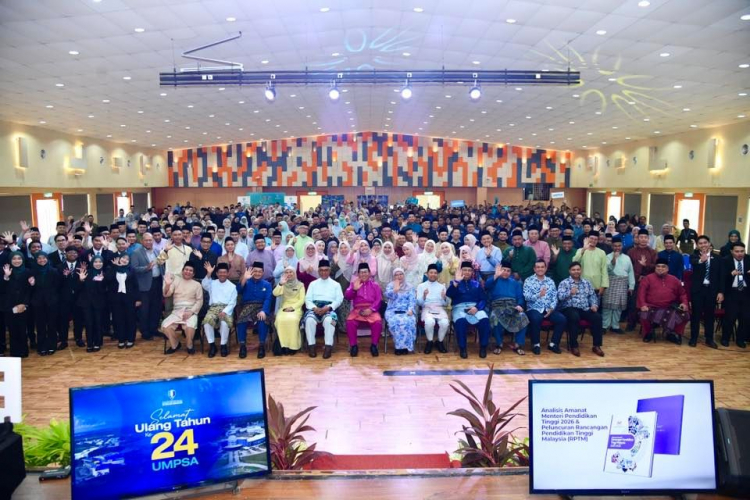Associate Professor Ts. Dr. Muhammad Aizzat produces advanced robotics that benefits in TVET
PEKAN, 21 May 2024 – The field of advanced robotics is increasing in the world market, but Malaysia is still lacking expertise.
Although advanced robotics are increasingly used abroad, the price and cost of importing products are also very expensive.
To ensure that more experts are trained, thus enabling Malaysia to develop more rapidly in high-tech fields, Lecturer of the Faculty of Manufacturing and Mechatronics Engineering Technology (FTKPM), Universiti Malaysia Pahang Al-Sultan Abdullah (UMPSA), Associate Professor Ts. Dr. Muhammad Aizzat Zakaria, 36, has produced DREBAR.
According to him, DREBAR is a sophisticated robotics module consisting of DREBARBox (DREBAR box that allows control to be done), DREBAR Operating System (operating system software based on open source software), and robotics-related software to enable advanced robotic systems to be controlled automatically.
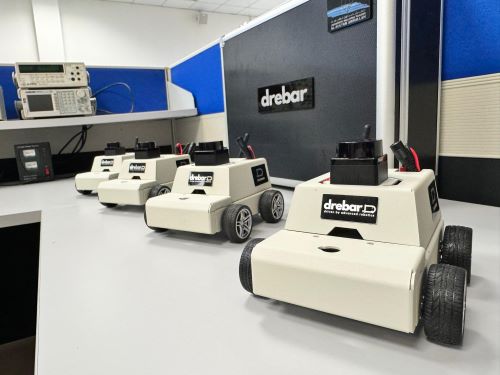
“It will communicate with DREBARbox and DREBAR OS to carry out advanced algorithmic functions such as Simultaneous Localisation and Mapping (SLAM), Obstacle Avoidance Module and others.
“DREBAR also has a robot simulator called DREBARSim which has several types of robots that can be used for robot simulation purposes for research and learning.
“The robot that has been configured with the DREBAR system will allow it to be controlled through the DREBAR software through a few simple steps,” he said.
He added that DREBARBox can also communicate with the internet and network which allows many robots to be controlled in one DREBARBox and various complex configurations can be carried out for those who want to conduct research using this product.
“When the DREBAR system is activated, it allows the robot to demo autonomous systems such as waypoint control, obstacle avoidance and decision-making processes by the robot at a high level,” he said.
This project receives collaboration from FTKPM lecturers, Dr. Ismayuzri Ishak and several lecturers from the Faculty of Mechanical and Automotive Engineering Technology (FTKMA), Dr. Muhammad Izhar Ishak, Ts. Dr. Mohamed Heerwan Peeie and Ts. Dr. Zulkifli Ahmad@Manaf, as well as two postgraduate students who assisted him in the fabrication process, Ericson Yong Ming Wei and Nurul Afiqah Zainal.
Associate Professor Dr. Muhammad Aizzat added that DREBAR, which started in 2022, has gone through several phases of improvement in terms of product software requirements and cosmetics compared to the initial version.
“This product has passed the prototype phase and has now been used for research and learning purposes at UMPSA and also by external professional participants in the TVET field.
“It is a research product resulting from the actual research work related to self-driving vehicle robots.
“Previously, several UMPSA researchers and I developed the Smart Campus Autonomous Vehicle (SCAV), an unmanned bus.
“In the SCAV research process, many new things that we have learned are related to advanced robotic technologies such as perceptions, localisation, planning and control and artificial intelligence.
“Robotics technology is a future technology that will be widely used in the near future,” he said.
“The problem arising from the development of SCAV is how they want to ensure that this project is not deprived of experts who can always contribute.
“We have also initiated several strategic developments to produce more experts for a sustainable robotic ecosystem,” he said.
Among others, he and the group initiated training related to robotic technology for postgraduate students at UMPSA.
They have also trained professionals from the TVET field who do not have expertise in robotics.
He said that problems arise when they face difficulties in some of the initial processes of sophisticated robotic systems such as installing software, configuring robotic systems and several other complex things.
“These problems wasted a lot of time and the original goal of learning this advanced robotic system was not achieved.
“DREBAR was created based on the problems faced.
“It aims to solve the problems faced and at the same time create more experts in the future,” he said.
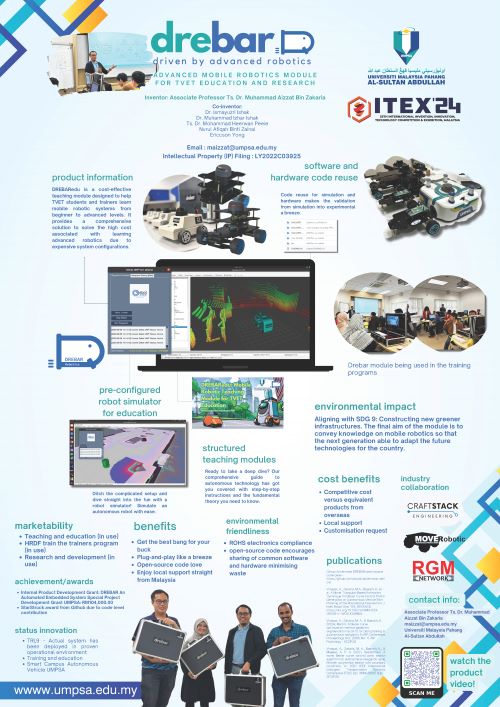
The DREBAR product has solved the software configuration problem, thus it can continue to be used for the purpose of learning advanced robotic systems and can also be used for research purposes without having to waste time with problems as before.
For now, the research group has been discussing with several agencies to place this product in several locations and try to get feedback on the effectiveness of the product on a larger scale and at the same time, there are several moves to expand the use of the product in several different sectors.
He said the estimated cost for DREBARbox, DRebar OS, training modules and robot kits (with LIDAR sensors, IMUs, odometers and low-level controllers) is around RM10,000.00 to RM20,000.00.
“This cost is cheaper than products from abroad which can reach tens of thousands of ringgit,” he said.
He expressed his gratitude to UMPSA for providing full financial support and advice on the direction of the product.
DREBAR has received a full funding grant from UMPSA through two grants, namely the Product Development Grant and the Made in UMP Grant.
In addition, this product receives collaboration from two industries, Move Robotic Sdn. Bhd. which helps to provide views and assessments on the added value of products along with technical advice.
Meanwhile, RGM Network Sdn. Bhd. is a consultant that allows this DREBAR to be used by professionals in the TVET field who want to learn advanced robotic systems.
He really hopes that DREBAR can be used by other TVET institutions which will also train the local community periodically at a minimum or free rate.
He said they are also trying to apply for community grants to enable this system to be placed in TVET institutions and can be used to train the surrounding community.
“I hope Malaysians who do not have the opportunity to set foot in the university can still learn these sophisticated systems that would normally only be in the university research laboratory,” he said.
Previously, a research group led by Ts. Dr. Mohamed Heerwan Peeie produced a Blackbox CamKenderaan product used by Cybersecurity Malaysia for digital forensic purposes.
This product has received a gold medal in the International Conference and Exposition on Inventions by Institutions of Higher Learning (PECIPTA’22) and a silver medal in the 35th International Invention, Innovation & Technology Competition & Exhibition, Malaysia (ITEX) 2024 which took place on 16 to 17 May 2024 at the Kuala Lumpur Convention Centre (KLCC).
By: Nur Hartini Mohd Hatta, Centre for Corporate Communications
Translation by: Dr. Rozaimi Abu Samah, Faculty of Chemical and Process Engineering Technology
- 214 views


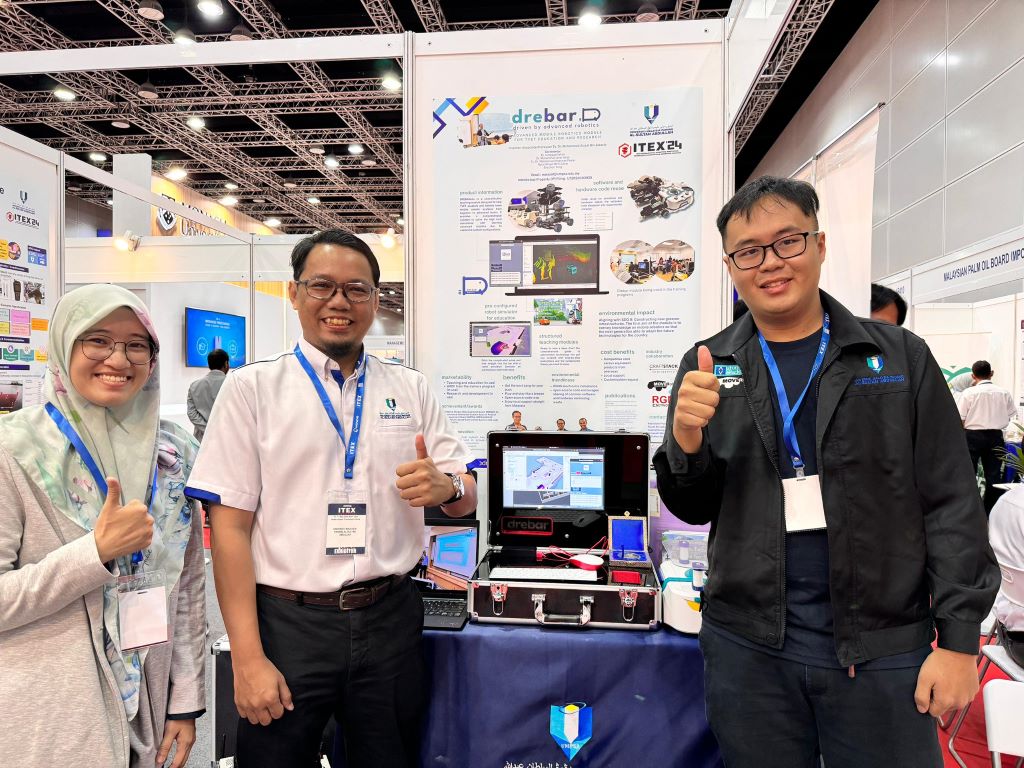
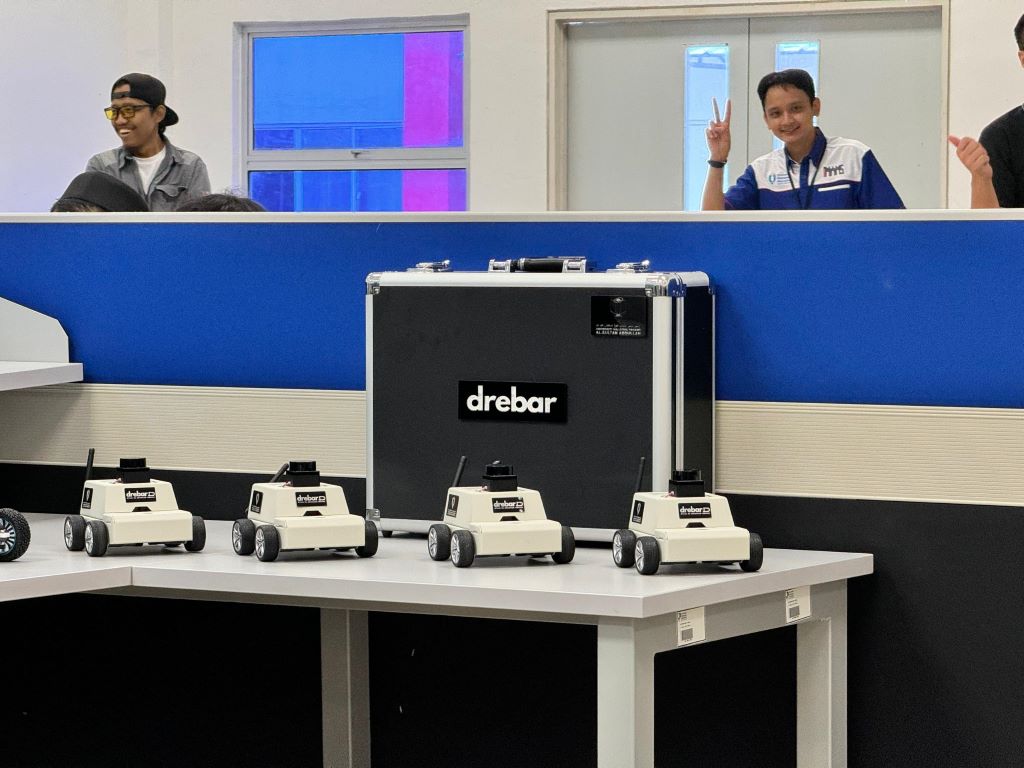
 Reports by:
Reports by: 